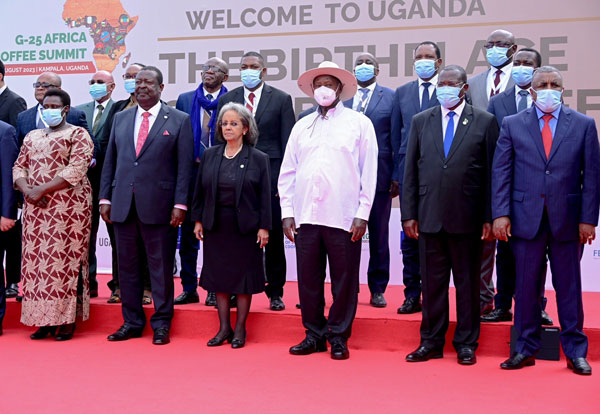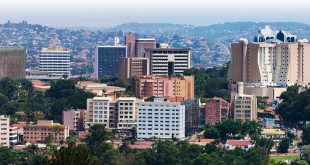
Kampala, Uganda | THE INDEPENDENT | Leaders from coffee-producing countries in Africa are formulating strategies to halt the export of raw coffee beans. This initiative is aimed at elevating the income of farmers and curtailing the exploitation perpetuated by Western nations.
The proposal emerged during the second meeting of the G-25 African Coffee Summit, held in Munyonyo on Tuesday. All participants at the summit, unanimously emphasized that for Africa to capitalize on the lucrative coffee industry, the continent’s producing nations must assume control and dominance within the market.
While opening the summit, President Yoweri Museveni presented statistics demonstrating that even though Africa contributes a significant portion of coffee to the global market, the producing countries reaped the least benefits from the coffee economy.
President Museveni added that all is not lost as the situation can be reversed by emphasizing the imperative for coffee-producing nations to enhance the value of their crop. He contended that this approach will not solely amplify revenue derived from the coffee industry but will also engender increased local employment opportunities, thereby mitigating the escalating unemployment rates.
The President underscored the viability of prohibiting the export of raw coffee and rectifying the inequitable international market dynamics. He told to the delegates that Uganda has already taken steps in this direction by imposing export bans on various raw materials, including valuable minerals such as uranium, copper, wolfram, and iron ore, along with currently sought-after resources like lithium.
The concept of prohibiting coffee exports is not novel, having been deliberated upon by various nations. Tanzania, for instance, has previously attempted such a measure, and in 2019, Kenya also endeavored to implement a law with a similar aim.
Nonetheless, uncompromising external factors and the influence of international market dynamics have consistently thwarted these efforts. To effect a transformation, African coffee-producing countries have united under the G-25 forum, where they seek to consolidate their voices and forge a collective stance. The inaugural summit took place last year in Nairobi.
Manssour Bin Mussallam, Secretary-General of the Organization of Southern Cooperation, said that it is quite perplexing that among the leading coffee-exporting nations, none actually possess coffee plantations, but they procure raw coffee from African countries and capitalize immensely on this trade.
Manssour’s revelation surprised delegates particularly when considering that countries like Germany, devoid of coffee trees, are amassing substantial profits from this enterprise.
President Sahle-Work Zewde of Ethiopia emphasized that implementing value addition has the potential to significantly improve the lives of those involved in the coffee supply chain, starting with the farmers. She emphasized the importance of a concerted and intentional endeavor by individual countries and collaborative efforts within the forum.
President Zewde observed that governments must enhance financial support and allocate additional resources to the sector in order to effect this transformation. This is particularly crucial considering the prevailing reality that a majority of African farmers continue to rely on traditional tools and methods.
Another concern that came up during the summit was the lower coffee consumption in Africa. Even those few individuals who are attempting to embrace coffee are opting for imported goods from European nations.
President Museveni who criticized Europeans for exploiting African coffee producers by taking up their raw coffee in what he described as a slavery trade approach openly admitted during the summit that he personally consumes imported coffee from Nestlé-owned Nescafé, a Swiss company. This revelation is intriguing given that Uganda stands as the second-largest coffee producer in Africa, trailing only behind Ethiopia, and boasts several indigenous coffee brands.
Dr. Girma Amente, Chairman of the Inter-African Coffee Organization, emphasized that the current practice of African nations consuming imported coffee from Europe has negative repercussions for the continent. This includes an increased import bill and heightened costs associated with coffee consumption within Africa. In his view, it is crucial to enact an intercontinental free trade agreement within Africa.
Dr. Amente underscored the necessity of establishing robust infrastructure and investing in the coffee value addition chain. As an illustration, he points to the example of Nigeria, possessing a substantial coffee market, yet relies on European imports. He highlights the logistical challenges, wherein it takes over seven months for coffee exporters from East Africa to reach Nigeria.
While African leaders were vehemently addressing the exploitative practices of Western countries, Ambassador Jan Sadek, the Head of the EU Delegation to Uganda, expressed the European Union’s interest in assisting African coffee-producing nations in their efforts to enhance the value of the crop for domestic consumption.
He cautioned that as African countries progress, it’s essential to have a clear understanding of their market, underscoring that Europe continues to be a significant partner in the coffee industry.
After Ambassador Sadek’s remarks, President Museveni interrupted the Master of Ceremonies and responded to Sadek. He said that the European preference for coffee produced in Europe could be attributed to the belief that once coffee is grown in Uganda, it might not remain fresh on the shelves for an extended period.
Museveni contested this rationale, highlighting that Africans, including himself, regularly consume coffee made in Europe, such as brands like Nescafé. He questioned the inconsistency, asking why Europeans shouldn’t similarly embrace coffee made in Africa or even consider establishing coffee processing plants on the continent.
The President further assigned the task to technology and industry experts, urging them to find credible responses that could be provided to Europeans in response to their claims.
*****
URN
 The Independent Uganda: You get the Truth we Pay the Price
The Independent Uganda: You get the Truth we Pay the Price


